Friends of Rosina Wallace were grateful she wasn’t home when her barn caught fire on Sunday, April 1.
“We know she would have been in there trying to save her cows,” said Anne Tisbert of the Vermont Farm Bureau. “That’s just who she is.”
“Those animals were like kids to her,” said Gordon Wood, one of Wallace’s cousins.
Wallace, 71, was celebrating Easter at a friend’s house when the fire broke out just before 7 p.m. in her barn on Blush Hill Road.
Rosina’s brother, Kay Alan Wallace, 66, who lived on the property with his sister, was home with her dog, a big, bearlike rescue named Bodhi. Kay was watching the news when he smelled smoke, but he didn’t think much of it at first — the neighbors had been burning brush for weeks.
But “it was stronger than usual,” said Kay, who’s known as Wally, a nickname he got as a student at Harwood Union High School.
He looked outside and saw thick, black smoke pouring out of the barn behind his house.
Wally called the Waterbury Fire Department and had time to get about three armfuls of his possessions out of the house before his sister got home.
As they watched their family farm burn down, Rosina wordlessly handed her coat to a young, shivering girl.
Neither Wally nor Rosina have children; instead, they had 23 Jersey cows, and a family legacy.
Wally lived in the white farmhouse closest to Blush Hill Road. It was built in 1840, he said, and he’d lived there all his life, except the five years he was married, and two years after a divorce, he said.
Rosina built the red building behind the farmhouse and barn and lived there with Bodhi.
The siblings’ grandfather, and all his brothers and sisters, were born in the farmhouse, and so was their father, Keith Wallace, and all his siblings, too.
All four of Wally and Rosina’s grandparents died in that farmhouse, and some of their funerals were held there, too.
Wallaces had worked the farm for more than 150 years.
“So much of our family history” was lost in the fire, Rosina said Monday morning as she clutched her grandmother’s doll to her chest. The doll, which had been her grandmother’s childhood toy, was unscathed, Rosina noted with amazement, since it had been in a cedar chest that firefighters managed to salvage during the night.
“Nothing is touched,” Rosina cried, opening the chest — a miracle, given the devastation to the property.
Coming to their aid
The community has rallied around the Wallace siblings. A fundraiser at YouCaring.com had raised almost $55,000 by Wednesday morning.
Skip Flanders, a member of Wesley United Methodist Church in Waterbury, said the church is collecting monetary donations for Rosina and Wally, who are longtime members.
The church might also collect furniture and clothing, once Rosina and Wally are sure of what they need, said Flanders.
Donations can be mailed to P.O. Box 214 in Waterbury, marked “Wallace Fund,” Flanders said.
Kids meet the calves
Both the red house where Rosina lived and the barn that housed the cows burned to the ground, leaving nothing behind. The white farmhouse where Wally lived was still standing Monday morning, but was knocked down by excavator after the brother and sister walked through it one last time.
Rosina did all the milking, and Wally helped in the stables, putting the hay in the barn. Keith Wallace, their father, was president of the Vermont Farm Bureau for 20 years, and Rosina has been president of the Washington County Farm Bureau, said John Jenkinson, the branch’s treasurer.
Rosina sold her milk to Cabot Creamery until her farm was certified organic. She had been selling her creamy Jersey milk to Stonyfield Farm in Londonderry, N.H.
There were three working dairy farms in Waterbury, until about 7 p.m. on Easter Sunday.
Now, there are just two.
“It’s that dismal. There’s that few,” Jenkinson said.
Vermont has about 780 dairy farms, said Joe Tisbert, president of the Vermont Farm Bureau.
Kids on the farm
As much as Rosina loved milking, what she loves best is passing on what she knows to the next generation. Lots of Waterbury kids have fond memories of meeting calves at Wallace Farm, or listening to Rosina talk about life as a farmer.
Zoe Buffum, a junior at Harwood Union High School, says she’s been going to the Wallace Farm to help Rosina since she was in the seventh grade.
“I kept coming back because it was such an amazing place to be,” Zoe said, the burning barn flickering in her eyes. “I’m still shocked. It’s kind of weird how something so important with so much history can just disappear.”
“It’s a great life,” Wood said about living on Rosina’s farm, where he helped out, too. “You might smell like manure by the end of the day, but you know you’ve done something.”
Wood sometimes helped his cousins as they took groups of kids through Wallace Farm.
“She lived for it,” he said. “She just loved doing this.”
“No kindergartner since forever didn’t come here,” said state Rep. Tom Stevens, who lives in Waterbury village.
“The entire Thatcher Brook Primary School community is saddened over the loss of the Wallace Farm, a community landmark and treasure. Our dear friend Rosina Wallace has provided many hours of instruction to hundreds of our students,” said Denise Goodnow, the school principal.
Kindergartners and first- and second-graders have been going to Wallace Farm for years, Goodnow said.
“One of the highlights of our trips to her farm is the activity Alphabet on the Farm, where at various locations letters of the alphabet are posted and children have to find something that begins with that letter of the alphabet. Many times Rosina's dog has met students coming off the bus with the letter ‘D’ hanging from his collar,” Goodnow said.
“Rosina's education background makes her the perfect person to make the trip to her local farm a rich learning experience for all students,” Goodnow said.
Rosina taught at St. Johnsbury Academy until the early 1980s, and also coached field hockey.
She was an inspiration to Delsie Hoyt, who graduated in the 1970s but has fond memories of Rosina’s coaching.
She was “such an influence on so many, particularly young girls,” Hoyt said, remembering Rosina’s strength as a female coach.
She was “always sunny, but just a forceful woman,” Hoyt recalled.
Rosina and Wally will need force to get through the coming weeks.
Water from the reservoir
It was a loss, said Waterbury Fire Chief Gary Dillon, who headed the firefighting effort, and whose children have visited the Wallace Farm.
The Waterbury Fire Department was helped by the Stowe, Waitsfield, Moretown, Middlesex and Bolton fire departments.
Since there are no hydrants near the Wallace Farm, Dillon said firefighters had to shuttle water from the Waterbury Reservoir, located at the end of Blush Hill Road.
It was 3,200 feet from the farm, Dillon said — “We had someone measure it out.”
Fire crews made about 30 trips to the reservoir, hauling back about 2,000 gallons each time, pouring about 60,000 gallons of water on the flames.
“When you’re fighting the wind, it’s sometimes not enough. It just blew the fire right through the property,” Dillon said.
Dillon’s crew first tried to save the red building and the white house, but “we just didn’t have the water. We had a lot of things working against us,” he said. “This is a once-in-a-lifetime fire, not in a good way, (that) you just hope you never have, and then you do.”
State fire investigators say the fire began in the electric systems in the milking house.
Dillon called the Wallace Farm a landmark.
“It’s something that will not be here that people will only be able to reminisce about,” he said.
“It’s surreal,” said Wally.
“I don’t know when it will sink in.”

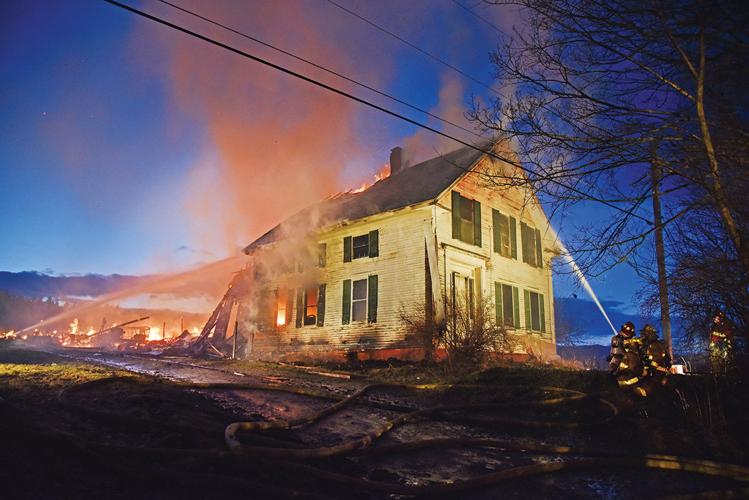
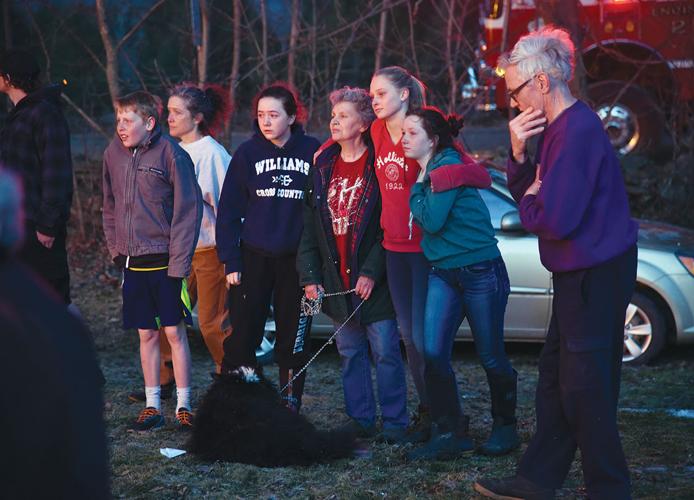






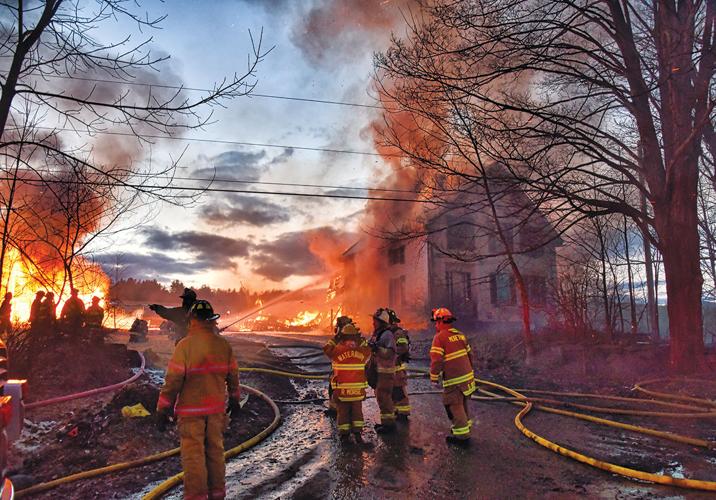











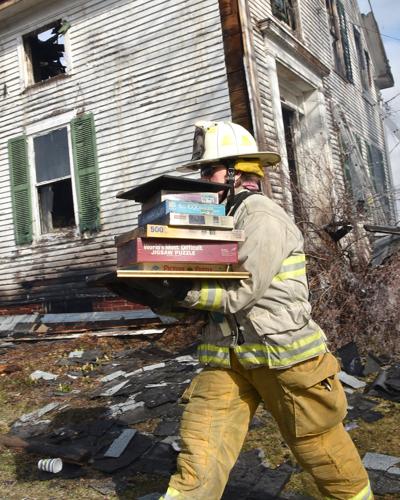

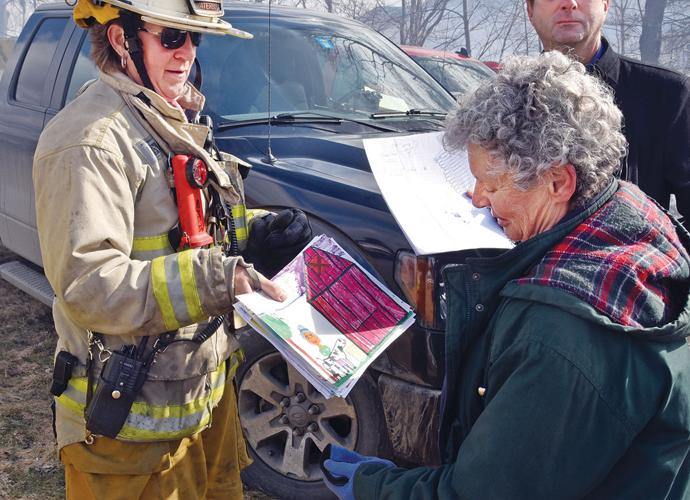
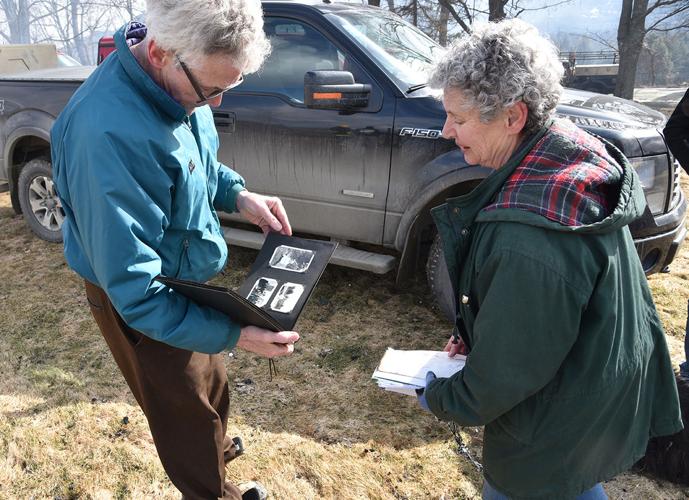


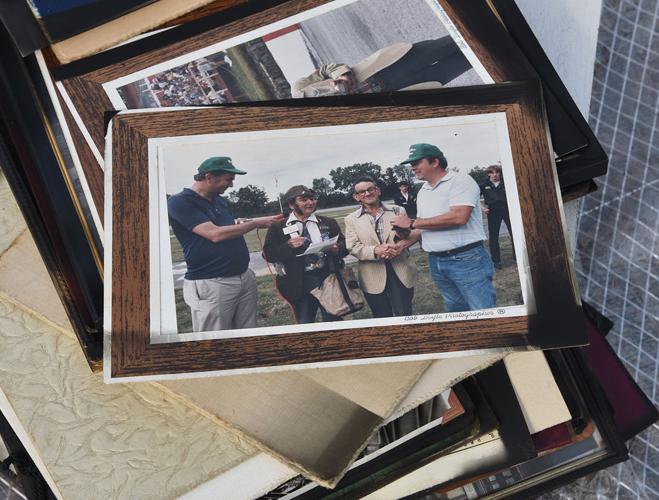

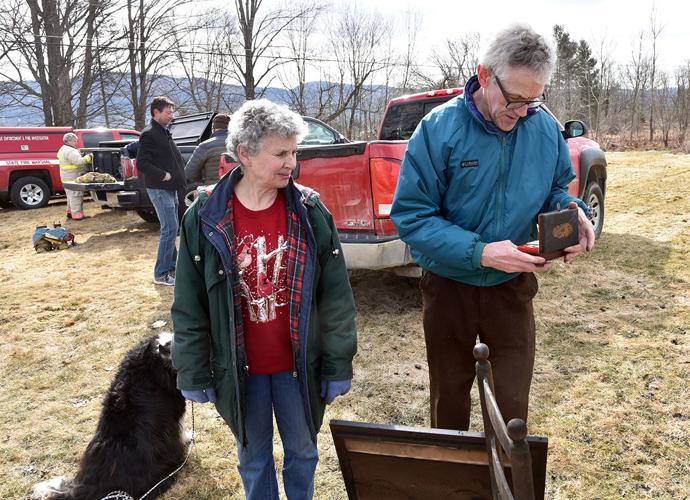



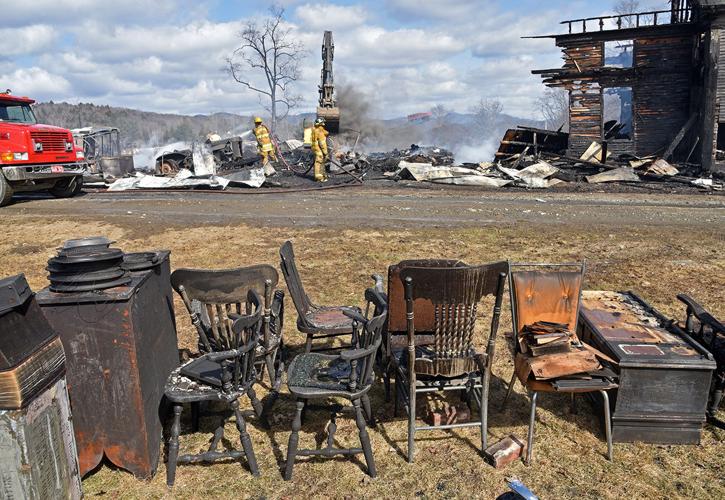











(0) comments
Welcome to the discussion.
Log In
Keep it clean. Please avoid obscene, vulgar, lewd, racist or sexual language.
PLEASE TURN OFF YOUR CAPS LOCK.
Don't threaten. Threats of harming another person will not be tolerated.
Be truthful. Don't knowingly lie about anyone or anything.
Be nice. No racism, sexism or any sort of -ism that is degrading to another person.
Be proactive. Use the "Report" link on each comment to let us know of abusive posts.
Share with us. We'd love to hear eyewitness accounts, the history behind an article.